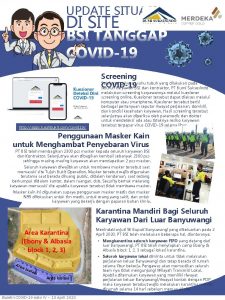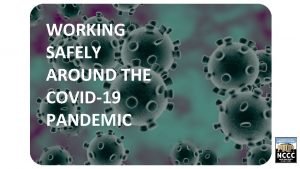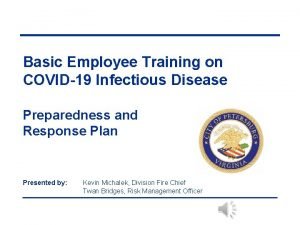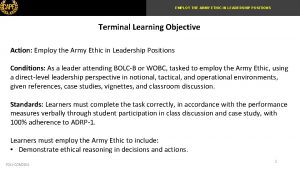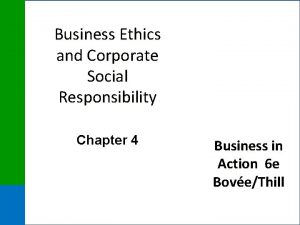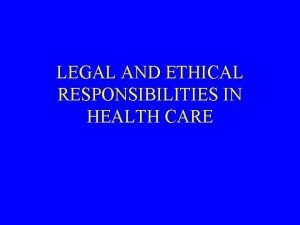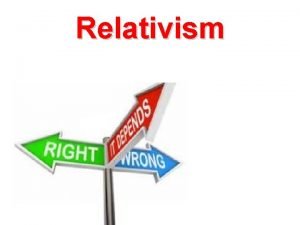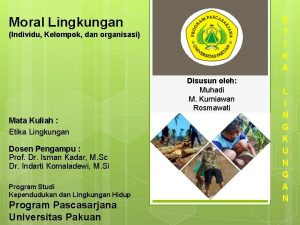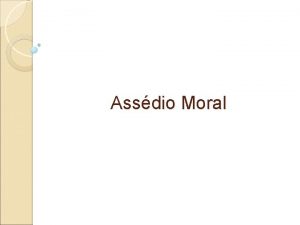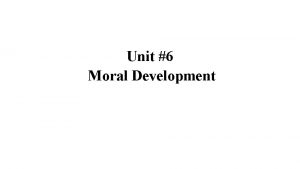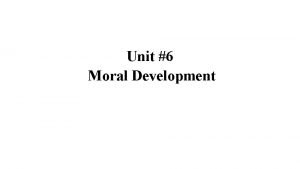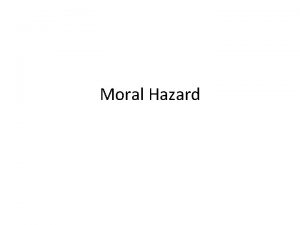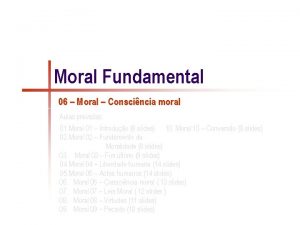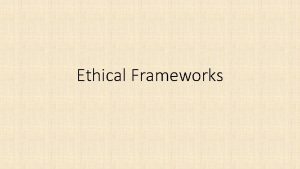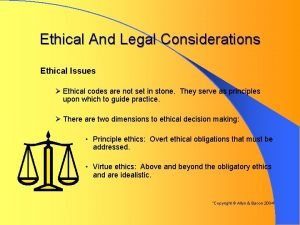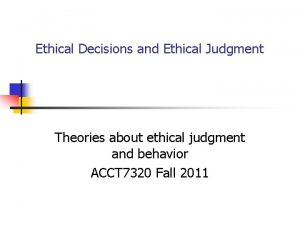COVID19 Supporting Ethical Care and Responding to Moral



















- Slides: 19

COVID-19: Supporting Ethical Care and Responding to Moral Distress in a Public Health Emergency Guidance, tools, and resources for Hospital Ethics Committees (HECs) Clinical Ethics Consultation (CEC) March 2020

Ethical Framework for Health Care Institutions Responding to Novel Coronavirus SARS-Co. V-2 (COVID-19) Guidelines for Institutional Ethics Services Responding to COVID 19 Managing Uncertainty, Safeguarding Communities, Guiding Practice Source Nancy Berlinger, Ph. D; Matthew Wynia, MD, MPH; Tia Powell, MD; D. Micah Hester, Ph. D; Aimee Milliken, RN, Ph. D, HEC-C; Rachel Fabi, Ph. D; Felicia Cohn, Ph. D, HEC-C; Laura K. Guidry-Grimes, Ph. D; Jamie Carlin Watson, Ph. D; Lori Bruce, MA, MBE; Elizabeth J. Chuang, MD, MPH; Grace Oei, MD, HEC-C; Jean Abbott, MD, HEC-C; Nancy Piper Jenks, MS, CFNP, FAANP The Hastings Center • March 16, 2020 https: //www. thehastingscenter. org/ethicalframeworkcovid 19/

Objectives This slide deck is designed for use within a health care institution’s COVID -19 preparedness and response activities, supplementing public health, clinical practice, and ethical guidance. It aims to quickly prepare hospital ethics committees (HECs) and clinical ethics consultation (CEC) services to 1) assess and shift their operations to reflect new tasks and work conditions, including resource scarcity, and 2) respond to changing ethical needs and concerns among clinicians caring for patients under contingency levels of care and, potentially, crisis standards of care. This slide deck is not intended to be, and should not be considered, a substitute for clinical ethics consultation or other medical, legal, or other professional advice on individual cases or for particular institutions. It reflects an evolving public health emergency; references are current as of March 23, 2020.

Copyright, Nathan Gray, MD, 2020. Used with permission. https: //inkvessel. com/2020/03/18/palliati ve-care-in-the-time-of-covid/

Clinicians, such as physicians and nurses, are trained to care for individuals. PROVI DING ETHICAL CARE IN A PUBL IC HEALTH EMERGENCY Public health emergencies require clinicians to change their practice to respond to the care needs of populations. In a public health emergency, the fair allocation of scarce resources requires clinicians to prioritize the community. The shift from patient-centered practice to patient care guided by public health duties creates great tension for clinicians, including clinical ethics consultants.

Clinical Ethics and Public Health Ethics Duties of Clinical Ethics Duty of care • Maintain fidelity to the patient (nonabandonment) • Relieve suffering • Respect the rights and preferences of patients Focus on individual patient. Duties of Public Health Ethics Recognize moral equality of persons Promote equity in distribution of risks and benefits • Promote public safety • Protect community health • Fairly allocate limited resources relative to need Focus on community.

Increasing Resource Scarcity

Institutional Ethics Services in a Public Health Emergency HECs and CECs should prepare for service: • Understand how resource allocation decisions and pressures— about “staff, space, and stuff”—arise in your institution and region during an infectious disease outbreak and may continue during a prolonged emergency. • Rapidly assess HEC/CEC staffing, processes, and practices to respond to clinical and institutional needs and protect the health care workforce. • Reframe ethics services to support patient care in context of the broader community, resource limitations, practice change.

The Duty to Plan: Ethics Services Determine the availability of committee members and consultation providers for service during a public health emergency, mindful that clinicians may have patient care roles and many members will be limited to remote access. Examples: • Assume critical-care and other clinicians will not be available for the HEC/CEC. • Develop a system to quickly identify who is available for ethics support, e. g. , Google Calendar App for smart phones. • Determine capacity for remote HEC/CEC work (tele-ethics) with equipment and software on hand. Limit “bedside” CEC to conserve personal protective equipment (PPE) and reduce infection risk. • Consider how community (nonstaff) HEC members can contribute perspectives and support staffing of ethics services during a public health emergency.

Preparing to Respond to Changing Ethics Needs Focus on the consequences of contingency levels of care for patientcentered care, the consequences of crisis standards of care for patient preferences, and how ethics services will support clinicians in managing foreseeable ethical challenges in institutions, health systems, and regions. Prepare for service on triage teams and other emergency response teams by reading The Hastings Center’s Ethical Framework for Health Care Institutions Responding to COVID-19, covering • public health duties in relation to the duty of care familiar to clinicians and clinical ethics (pp. 2 -4); • institutional policies, processes, or practices concerning HECs and CEC in need of rapid review or updating to reflect changing conditions (pp. 5 -6); • Guidelines for Institutional Ethics Services (p. 7); • examples of resource allocation tools and frameworks (pp. 8 -10).

How HEC/CEC Can Support Rapid Review and Update of Institutional Policies and Processes • Collaborate with triage teams and with other hospitals and health systems regionally to work toward uniform policies regarding foreseeable ethically challenging issues in responding to COVID-19, e. g. , unilateral DNR, triage protocols, and vulnerable groups. • Confer with hospital legal counsel to discuss how relevant laws concerning decision-making and patients’ rights apply in pandemic conditions. • Update policies concerning the care of hospitalized patients who do not have COVID-19 in light of institutional resource limitations and infection control. • Determine how to conduct institutional decision-making processes for “patients alone” (unrepresented) more efficiently, with reduced “bedside” consultation. • Consolidate CEC oversight mechanisms for ongoing remote review, e. g. , by an HEC subcommittee in place of interdisciplinary case conferences. • Identify other institutional policies and processes (see Hastings Center COVID-19 Ethical Framework, pp. 5 -6, for examples) where the HEC or CEC can assist

Review and Update CEC Processes Review and update clinical ethics consultation (CEC) processes and practices to accommodate resource limitations, infection control restrictions, and visitor restrictions. Examples: • Use remote technologies, including smart phones, for patient and family meetings to conserve PPE, reduce exposure risks, and accommodate visitor restrictions. • Determine if the CEC team can shorten response time to requests for ethics support, e. g. , shifting from 72 -hour to 24 -hour response time. • Consider how rounding and other informal ethics support can take place virtually to conserve PPE and reduce exposure risks.

Copyright, Nathan Gray, MD, 2020. Used with permission. https: //inkvessel. com/2020/03/18/palli ative-care-in-the-time-of-covid/

Respond to Moral Distress Moral distress—the feeling of being unable to “do the right thing” or being helpless to avoid wrongdoing or harm—is foreseeable during a prolonged public emergency and severe resource limitations affecting patient care and health care workforce safety. Prepare to respond to moral distress under crisis conditions, with attention to clinical units such as the ED, medical ward, and ICU, and to support across shifts. 1) Determine how ethics support can help manage moral distress. Define and give examples of moral distress in workforce outreach. Useful resource: https: //www. cstsonline. org/assets/media/documents/CSTS_FS_Sustaining_Well_Being_Healthcare _Personnel_during. pdf 2) Identify information about other support services, e. g. , employee assistance programs (EAPs), spiritual care/chaplaincy, and counseling, available in your institution or remotely. 3) Collaborate with your Human Resources Department to post information about support services in staff spaces (break rooms, rest rooms, etc. ). 4) Work with unit leadership or Human Resources to identify opportunities for remote support. Determine if drop-in spaces for support are feasible and desired.

Copyright, Nathan Gray, MD, 2020. Used with permission. https: //inkvessel. com/2020/03/18/palliative-care-inthe-time-of-covid/

CEC and Interdisciplinary Palliative Care Collaborate with interdisciplinary palliative care services concerning practice under contingency and crisis conditions. Examples: • Cross-train with palliative care teams to support understanding of public health duties in relation to the duty of care familiar to clinicians and clinical ethics (see Ethical Framework for Health Care Institutions Responding to COVID-19, pp. 2 -4). • Support communication with patients and families concerning pandemic-specific advance care planning, resource limitations, and palliative care for patients with severe COVID-19. • Participate in institutional and regional efforts by palliative care services to ensure palliative care availability and fair allocation of PPE to skilled nursing facilities (SNFs), board and care facilities, and home care.

Copyright, Nathan Gray, MD, 2020. Used with permission. https: //inkvessel. com/2020/03/18/palliativ e-care-in-the-time-of-covid/

• J. G. Adams and R. M. Walls. “Supporting the Health Care Workforce during the COVID-19 Global Epidemic. ” JAMA. March 12, 2020. https: //jamanetwork. com/journals/jama/article -abstract/2763136 • N. Berlinger et al. Ethical Framework for Health Care Institutions Responding to Novel Coronavirus SARS-Co. V-2 (COVID-19). March 16, 2020. https: //www. thehastingscenter. org/ethicalframeworkcovid 19/ Selected Resources • Center for the Study of Traumatic Stress, Department of Psychiatry, Uniformed Services University. “Sustaining the Well-Being of Healthcare Personnel during Coronavirus and Other Infectious Disease Outbreaks. ” 2020. https: //www. cstsonline. org/assets/media/documents/CS TS_FS_Sustaining_Well_Being_Healthcare_Personnel_durin g. pdf • T. Cunningham. , ed. Google Drive repository for Pandemic/COVID-19 ethics resources. Includes resources from academic and government sources, plus guides and templates for institutional policy development. https: //drive. google. com/open? id=1 B 9 Ub 9 Si. JHOHe 9 El. Vy 4 ZTI 81 IGf. K 0 EB- • Vital. Talk. COVID-Ready Communication Skills: A Playbook of Vital. Talk Tips. March 20, 2020. https: //docs. google. com/document/d/1 u. Sh 0 Fe. Ydk. Gg. Hs. Zqem 552 i. C 0 Km. XIga. GKohl 7 Soe. Y 2 UXQ/edit

Contributors • • Nancy Berlinger, Ph. D, Research Scholar, The Hastings Center • • • Laura Guidry-Grimes, Ph. D, Clinical Ethicist, University of Arkansas Medical Center Felicia Cohn, Ph. D, HEC-C, Bioethics Director, Kaiser Permanente Orange County Lori Bruce, MA, MBE, Chair, Community Bioethics Forum, Yale School of Medicine Rachel Fabi, Ph. D, Assistant Professor, Center for Bioethics and Humanities, SUNY Upstate Medical University Jamie Carlin Watson, Ph. D, Clinical Ethicist, University of Arkansas Medical Center Grace Oei, MD, MA, HEC-C, Director of Clinical Ethics, Loma Linda University Health Jean Abbott, MD, HEC-C, Professor Emerita, Emergency Medicine, University of Colorado Jacob Moses, Ph. D candidate, Department of History of Science, Harvard University • Research, editorial, and design assistance: Isabel Bolo, Bethany Brumbaugh, Laura Haupt, Nora Porter, Ben Wills • Graphic medicine illustrations: Nathan A. Gray, MD, Palliative Medicine Specialist, Duke University Hospital
 Http//apps.tujuhbukit.com/covid19
Http//apps.tujuhbukit.com/covid19 Do if you covid19
Do if you covid19 Covid19 athome rapid what know
Covid19 athome rapid what know What do if test positive covid19
What do if test positive covid19 Vaksin covid19
Vaksin covid19 Ethical decision making and ethical leadership
Ethical decision making and ethical leadership Strict norms that control moral and ethical behavior
Strict norms that control moral and ethical behavior Level of care primary secondary tertiary
Level of care primary secondary tertiary Perbedaan ethical dilemma dan ethical lapse
Perbedaan ethical dilemma dan ethical lapse Army ethical reasoning model
Army ethical reasoning model Perbedaan ethical dilemma dan ethical lapse
Perbedaan ethical dilemma dan ethical lapse Moral realism
Moral realism Difference between ethics and morality
Difference between ethics and morality Ethical and legal responsibilities of healthcare workers
Ethical and legal responsibilities of healthcare workers What happens if we leave afghanistan
What happens if we leave afghanistan Moral kelompok adalah
Moral kelompok adalah Moral de esclavos y moral de señores
Moral de esclavos y moral de señores Manipulated variable and responding variable graph
Manipulated variable and responding variable graph Why are line graphs powerful tools in science
Why are line graphs powerful tools in science Congrats dialogue
Congrats dialogue
